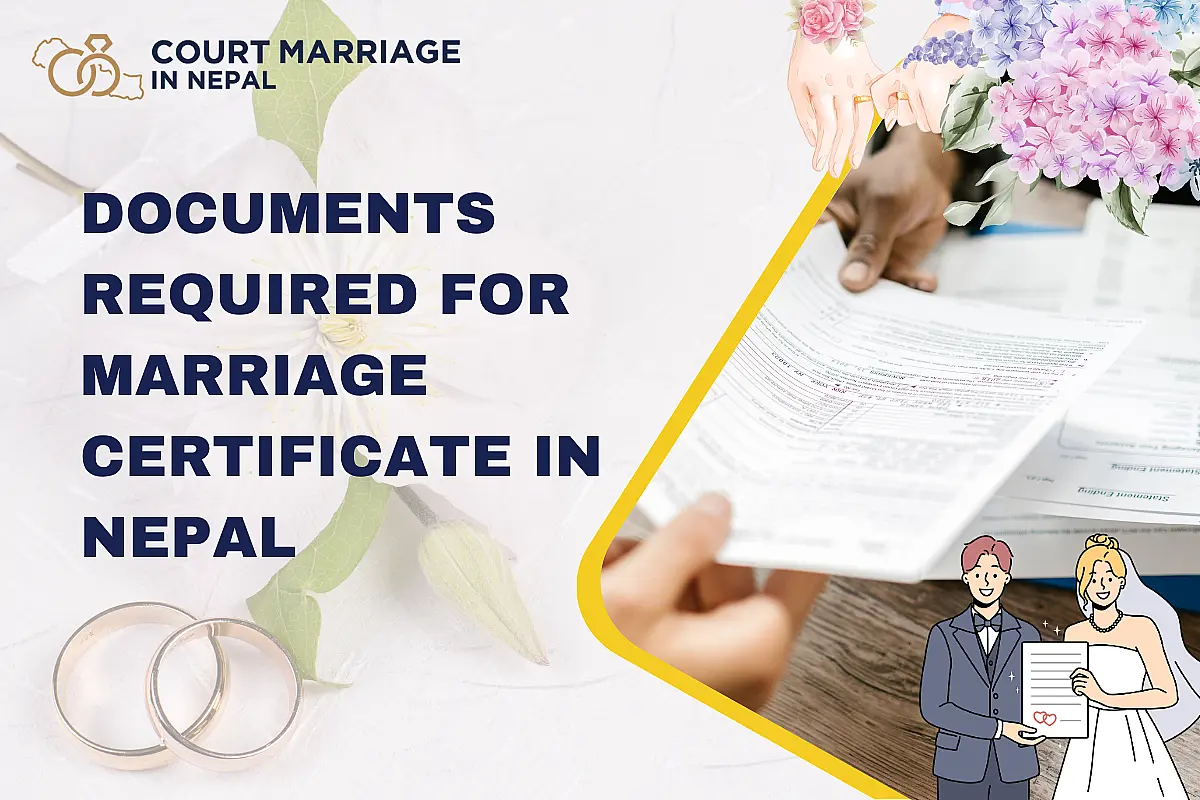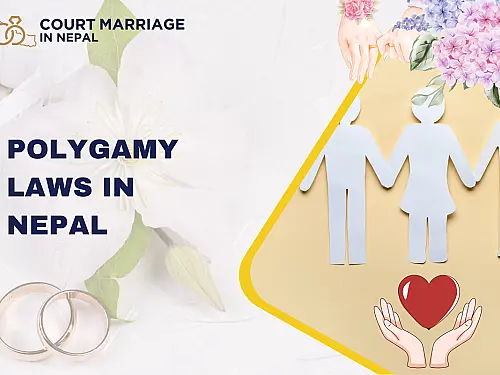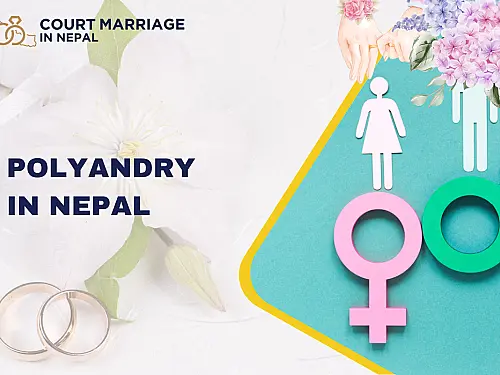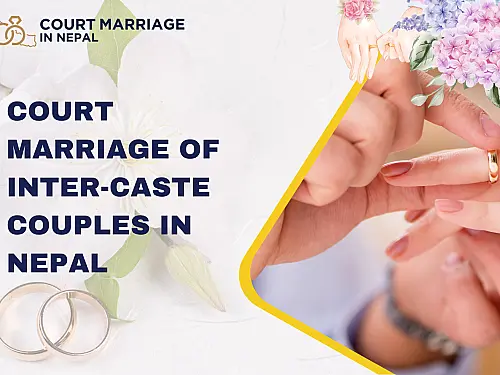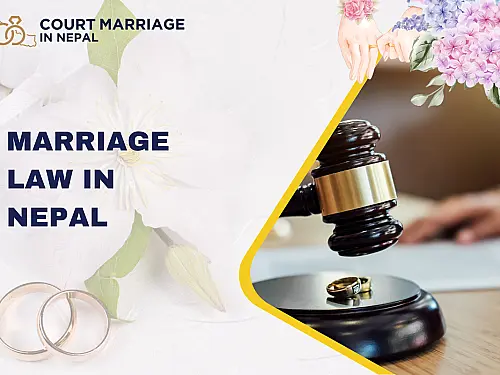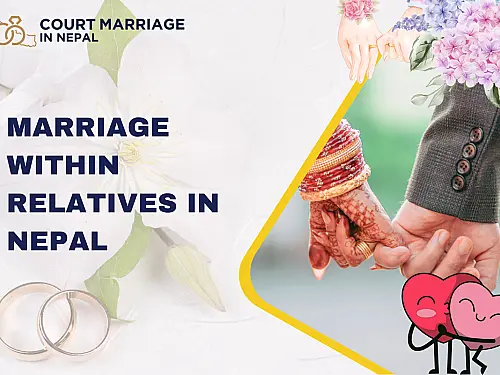Table of Contents
In Nepal, acquiring a marriage certificate means officially acknowledging a partnership according to the law.
There are two main forms of marriage registration:
- Court marriage (often referred to as civil marriage) and
- Registration of a traditional or ritual marriage (known as customary marriage).
The paperwork and procedural details differ based on the kind of marriage and the nationalities of the people involved.
Court Marriage
Court marriage in Nepal is a legal procedure where two people apply directly to the District Court for marriage, bypassing the requirement for traditional ceremonies. This kind of marriage is prevalent among partners from varied castes, religions, or nationalities, as well as those opting for a union without a conventional ceremony. The court serves as the governing body that confirms eligibility and legal adherence prior to issuing the marriage certificate. This procedure guarantees that both individuals agree to the relationship, satisfy the legal age criteria, and are not currently wed to another person. This kind of marriage holds special significance for:
- Inter-caste or inter-faith couples
- Partners looking to steer clear of traditional rituals
- Couples that include one or more foreign citizens
- People seeking legal or immigration recognition for their marriage.
Registration of a Customary (Traditional) Marriage
In this manner, a marriage that has taken place in accordance with traditional, religious, or community practices is subsequently recorded at the relevant Ward Office or District Office. This is relevant to many marriages in Nepal, where pairs participate in ceremonies like swayambar, janti, and phoolpati, according to their cultural traditions. The aim of registering this marriage is to secure an official certificate that recognizes the marriage legally. This certificate is crucial for legal rights, documentation of citizenship for children, and access to services such as banking and inheritance.
This kind of registration is relevant when:
- The wedding has already occurred according to Hindu, Buddhist, Christian, or other traditional customs.
- The couple is now pursuing formal acknowledgment of their relationship from the government
Marriage Involving Foreigners
When either or both individuals in the marriage are non-nationals, the paperwork becomes more intricate, frequently necessitating document verification from embassies, notarized statements, and approvals. This is relevant for both court marriage and the documentation of ceremonial marriages. Officials thoroughly check the legal qualifications of foreigners intending to marry, making sure they do not breach any national or global legal regulations. Further administrative measures are required, such as translations and legal confirmations.
Non-citizens generally need to show:
- Their legal ability to wed according to the laws of their home nation.
- That they are not presently wed to anyone else.
- An appropriate visa or residence permit in Nepal, based on their circumstances.
While the exact documents differ based on the type of marriage and the nationalities of the individuals, the primary goal of securing a marriage certificate in Nepal is to guarantee that the union is legally acknowledged. Regardless of whether the marriage is arranged in a traditional manner or formally executed through the court, registration protects the legal rights of both individuals and guarantees adherence to national marriage regulations.
For Nepali Citizens (Court Marriage or Registration of Traditional Marriage)
Form for Application
For both kinds of marriage registration, the process starts with handing in an official application form. This form needs to be completed clearly and correctly, adhering to the format set by the authority either the District Court for court marriages or the Ward Office for traditional marriage registrations. The document includes crucial details regarding the bride and groom, including their names, addresses, birthdates, and relationship status. It also encompasses statements confirming their agreement to the marriage and adherence to legal stipulations like age and eligibility. The form acts as the main official application to register the marriage.
Certificates of Citizenship
Both individuals involved in the marriage must provide their citizenship certificate, including the original document and a photocopy. This document serves to confirm the identity, age, and nationality of the applicants. Given that the legal minimum age for marriage in Nepal is 20 years without parental approval, the citizenship certificate is essential for verifying that the individuals fulfill this age criterion. It also verifies that both persons are legal citizens of Nepal, which may ease the process when compared to marriages with foreigners.
Passport sized photo
Photographs are needed to identify the candidates and be included with their application. For a court marriage, usually four passport-sized photos from each individual are required. For traditional marriage registration, the requirement can reach four photos per person, as extra photos might be utilized for records, documentation, and official archives. The pictures need to be up-to-date and distinctly display the applicant’s face. Occasionally, these images are included with the final marriage certificate for verification.
Certificates of Citizenship for Two Witnesses
To register a marriage, two adult witnesses must be present, and each is required to present their citizenship certificate (both original and a photocopy). These witnesses serve a legal function in verifying that the marriage occurred with mutual agreement. They sign the marriage papers with the couple and affirm that the marriage took place voluntarily and without pressure. The witnesses must be citizens of Nepal and mentally competent, usually being friends, family members, or reliable acquaintances of the couple.
Certificate of Single Status (Unmarried/Divorce Letter)
If either individual is temporarily living in a district different from their permanent address, they need to acquire a residence verification letter from the Ward Office where they are currently staying. This letter verifies that the individual has resided in the jurisdiction for a minimum of 15 continuous days. It enables people to register their marriage in a place outside their home district, providing convenience for those residing elsewhere due to work, education, or other factors.
Wedding Pictures or Proof of Ceremony
To register a traditional marriage, officials need evidence that the marriage ceremony occurred. This may encompass images of the wedding ceremonies, invitation cards, or additional records like testimonies from priests or relatives. These documents act as proof that the marriage was carried out in accordance with cultural or religious practices, and that the registration is not founded on a deceitful assertion. The evidence aids in confirming the legitimacy of the marriage being recorded.
These documents together guarantee that the marriage is legally recognized, consensual, and accurately registered within Nepal's civil registry system. Every document aims to protect individual rights and to avert fraud, underage marriage, or polygamy, while offering an official record for future legal, administrative, and social purposes.
For Foreigners Marrying in Nepal (or Nepali-Foreigner Couples)
All Necessary Documents for Nepali Citizens
In unions between a Nepali and a foreign citizen, the Nepali spouse must provide all the usual documents needed from Nepali citizens like the application form, citizenship certificate, certificate of single status, passport-sized photographs, and information of witnesses. These assist in confirming the Nepali partner’s identity, eligibility, and agreement to marry according to Nepali law.
Original Passport and Photocopy (For the Overseas Partner)
The foreign national is required to show their original passport and a photocopy of the passport. This document acts as their formal identification and evidence of citizenship. It also assists in verifying their age and legal standing as a visitor or resident in Nepal.
Authorized Nepali Visa
A valid visa is required to demonstrate that the foreign national is residing in Nepal legally. This might be a tourist visa, work visa, or another kind of permitted stay. Authorities will not review a marriage application without a valid visa. The visa page must be displayed during submission, and a copy is typically included with the application.
Certificate of No Objection (NOC)
The No Objection Certificate is provided by the embassy or consulate of the foreigner in Nepal. It verifies that the person is legally permitted to marry according to the laws of their country of origin and that the embassy has no objections to the marriage occurring in Nepal. This certificate is among the crucial documents, as it guarantees Nepali officials that the foreigner isn't breaching their home country's laws through overseas marriage.
Marriage Law of Home Country (Translated to Nepali and Notarized)
The foreign individual must additionally provide a copy of the marriage law from their country of origin. This law needs to be translated into Nepali and notarized to confirm that the marriage between a Nepali citizen and a foreigner is legally acknowledged in the foreigner's home country. This stipulation aids in guaranteeing that the marriage will be recognized globally and could also serve for upcoming visa or immigration needs.
15-Day Stay Verification
The foreigner needs to secure a residence certificate from the local Ward Office, verifying that they have been in Nepal physically for a minimum of 15 consecutive days prior to applying for marriage registration. This condition exists to guarantee that the person is truly residing in the country and not merely making a brief visit for a hasty or deceitful marriage. The certificate relies on hotel documentation, lease contracts, or local testimonies.
Collectively, these documents assist the authorities in Nepal in confirming the authenticity of the marriage, safeguarding the rights of both individuals, and preventing unlawful or forced unions. They also guarantee that the marriage is acknowledged in both nations, establishing a solid legal basis for the couple’s future.
Key Points and Process of Court Marriage in Nepal
Witnesses Are Required for Every Marriage Registration
In all forms of marriage registration either court marriage or the registration of a customary marriage there should be minimum two adult witnesses which is mandated by law. These witnesses are required to be present throughout the registration process and need to present valid identification (usually citizenship certificates for Nepali witnesses). Their function is to verify that both parties entered the marriage voluntarily, free from coercion or deceit. They also sign the formal documents to certify the marriage before the relevant authority.
All Papers Must Be Original and Bring Photocopies for Submission
When applying for marriage registration, original documents need to be shown for verification by authorities. These consist of citizenship certificates, passports, visas, and any additional certificates such as single status or NOC. Nevertheless, the photocopies of these documents are what will be submitted and retained by the office for recordkeeping. Presenting both original documents and their photocopies guarantees a smooth process and prevents unnecessary delays caused by absent paperwork.
Application Is Submitted at the Local Ward Office or District Court
The location for submission varies based on the kind of marriage:
- To have a court marriage, the couple needs to submit their application at the District Court located in the area where one of them lives or is currently staying.
- For a traditional marriage registration, the couple submits their application at the local Ward Office where either the bride or groom maintains their permanent or temporary residence.
Different offices might have varying procedural practices, so it’s advisable to consult the appropriate office in advance or review posted notices for regional requirements.
Marriage Certificate Granted in 2–4 Days (for Nepali Couples)
For citizens of Nepal, after the application is finalized and all paperwork is correct, the marriage certificate is usually provided within 2 to 4 business days. The timeline might differ a bit based on workload, holidays, or the efficiency of local administration. In comparison, cases that include foreigners can often take a little longer to handle because of:
- Authentication of documents issued by embassies
- Translation and certification of international regulations
- Increased examination to adhere to global standards.
Couples that include foreign partners should consequently prepare for longer processing times and steer clear of submitting applications at the last moment.
Improper or Absent Documents Are the Primary Reason for Delays
A frequent cause of delays in marriage registration is the presentation of incomplete or inaccurate documents. Lacking signatures, expired certificates, missing necessary translations, or invalid witness identification can lead to the application being rejected or postponed. To prevent these problems, partners ought to:
- Thoroughly examine the existing list of necessary documents.
- Inquire at the local office or court regarding any updates or local regulations.
- Make sure that translations are authorized and that documents are current and legitimate.
- Comprehensive preparation significantly boosts the likelihood of a quick and effective registration.
These essential points emphasize the significance of being adequately prepared and knowledgeable prior to starting the marriage registration procedure in Nepal. Regardless of whether it’s a straightforward court marriage or a more complex situation involving a foreign citizen, adhering to the proper steps guarantees legal acknowledgment and prevents unwarranted obstacles.
Marriage Registration Document Requirements
| Document | Nepali Citizens | Foreigners Marrying in Nepal |
|---|---|---|
| Application Form | ✓ | ✓ |
| Citizenship Certificate (both parties) | ✓ | Nepali partner only |
| Passport (original + copy) | ✓ | |
| Valid Visa | ✓ | |
| Single Status Certificate (from ward office) | ✓ | Nepali partner only |
| No Objection Certificate (from embassy) | ✓ | |
| Marriage Law (translated & notarized) | ✓ | |
| 15-Day Proof of Stay (temporary residence) | If applicable | ✓ |
| Passport-size Photos (4 each) | ✓ | ✓ |
| Witnesses’ Citizenship Certificates (2) | ✓ | ✓ |
| Marriage Photos/Evidence (for traditional only) | If required | If traditional only |
Frequently Asked Questions
At Court Marriage In Nepal, a registered law firm operating as Court Marriage In Nepal Pvt. Ltd., we specialize exclusively in Court Marriage Nepal. As the first law firm in Nepal dedicated to court marriage services, we assist both Nepali citizens and foreign nationals with the court marriage registration process in Nepal, including complete legal support for court marriage registration for foreign citizens in Nepal. As a trusted marriage firm in Nepal and a licensed law firm in Nepal, we ensure a smooth, lawful, and stress-free experience. Contact us today for confidential assistance with court marriage registration in Nepal.

